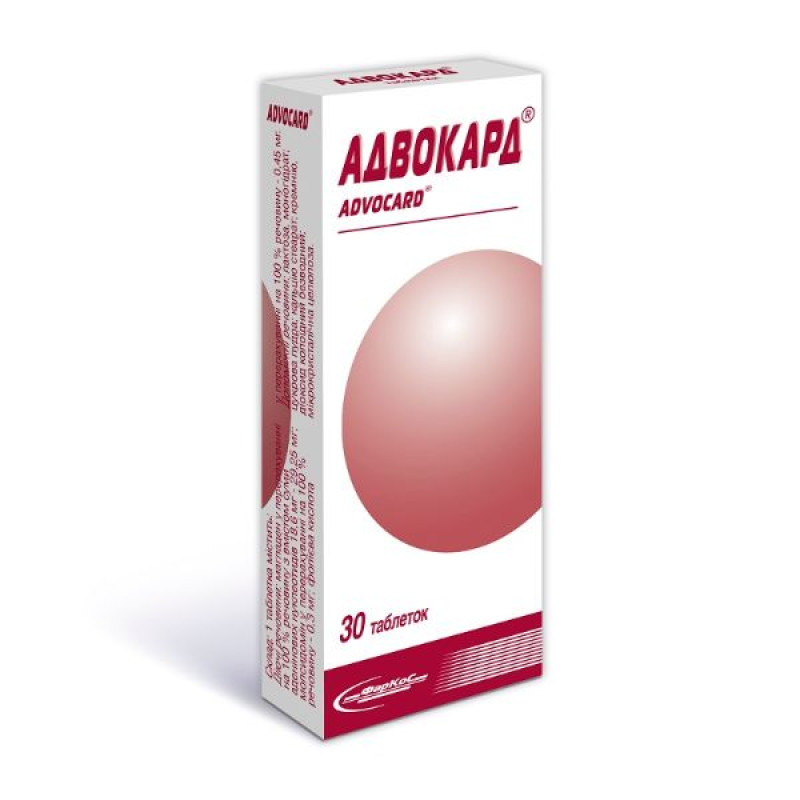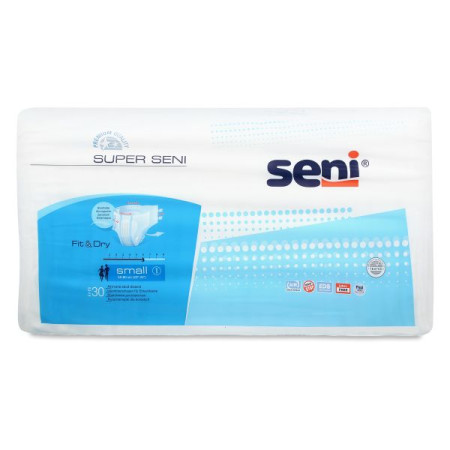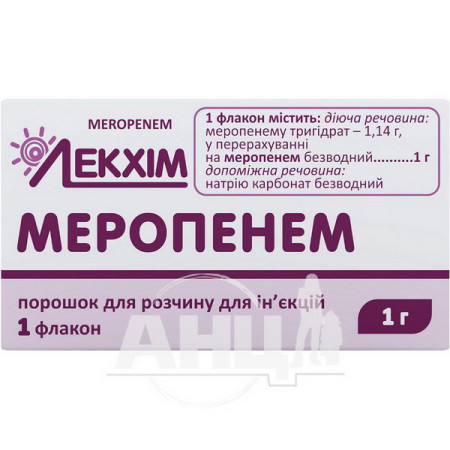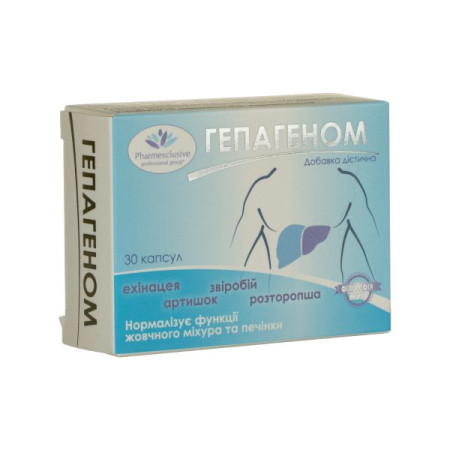Advocard tablets blister pack No. 30

Instructions Advocard tablets blister No. 30
Composition
active ingredients: 1 tablet contains: magladena in terms of 100% substance with a content of the sum of adenine nucleotides 18.6 - 29.25 mg, molsidomine in terms of 100% substance - 0.3 mg, folic acid in terms of 100% substance - 0.45 mg;
Excipients: lactose monohydrate; powdered sugar; colloidal anhydrous silicon dioxide; microcrystalline cellulose.
Dosage form
Pills.
Main physicochemical properties: light yellow tablets with inclusions of more intense color, flat-cylindrical shape, with a bevel and a score.
Pharmacotherapeutic group
Combined cardiological drugs. ATS code C01E X.
Pharmacological properties
Pharmacodynamics
ADVOCARD is an original combined drug. It has antianginal and antiischemic effects, has membrane-protective and antioxidant effects, improves myocardial metabolism, protecting cells from hypoxia, and has an antiatherosclerotic effect by normalizing homocysteine metabolism. The mechanism of action of ADVOCARD is associated with the complex effect of the drug's ingredients.
Magladen affects purine (adenosine) receptors and thus leads to the activation of potassium channels. Activation of potassium channels leads to the inhibition of the influx of calcium ions into the cell, which is accompanied by anti-ischemic, membrane-stabilizing, antiarrhythmic effects. By affecting ATP-dependent potassium channels (KATP) of mitochondria, Magladen promotes the development of processes aimed at protecting the myocardium from damage associated with its ischemia.
Due to its effect on purine receptors, magladen exhibits an antiplatelet effect.
Molsidomine and its active metabolites SIN 1 and SIN 1A are nitric oxide donors. Nitric oxide stimulates the guanylate cyclase system and activates ATP-sensitive potassium channels, which leads to blocking the influx of calcium ions into vascular cells and is accompanied by their expansion. This explains the synergistic effect of magladen and molsidomine on hemodynamic parameters.
Unlike organic nitrates, the drug does not develop addiction. Molsidomine has a positive effect on systemic hemodynamics, reducing the load on the myocardium. By blocking the synthesis of platelet phospholipases and activating the synthesis of prostacyclin by the vascular wall, molsidomine exhibits antiplatelet properties.
Folic acid is involved in many metabolic processes. Of particular importance is the participation of folic acid in the transformation of homocysteine, which is a factor in the development of atherosclerosis. By reducing the level of homocysteine, folic acid exhibits an anti-atherosclerotic effect. By stimulating metabolic processes in the myocardium, folic acid improves its functional activity.
The drug in conditions of coronary insufficiency exhibits an energy-saving effect by reducing the myocardial oxygen demand. ADVOCARD reduces the amount of lactate in the myocardium, inhibits the activity of membrane-bound phospholipases, prevents structural and functional damage to cardiomyocyte membranes, ensures the constancy of the quantitative and qualitative composition of membrane lipids. ADVOCARD improves coronary blood flow, increases tolerance to physical exertion, reduces the frequency and severity of angina attacks. In patients with heart failure, improving the metabolic support of the myocardium and through normalization of hemodynamic indicators, increases the left ventricular ejection fraction. The use of the drug contributes to the normalization of the concentration of magnesium ions in the tissues. ADVOCARD exhibits an antiarrhythmic effect.
Pharmacokinetics
The pharmacokinetics of the drug have not been studied.
Indication
As part of the complex therapy of ischemic heart disease and heart failure, angina pectoris of exertion and rest; prevention and treatment of angina attacks.
Contraindication
Individual hypersensitivity to the drug or its ingredients. Severe arterial hypotension; severe forms of bronchial asthma; cardiogenic and other types of shock; acute stage of myocardial infarction, especially with low blood pressure; craniocerebral trauma; sinoatrial and atrioventricular block of II-III degree; hemorrhagic stroke; glaucoma, especially angle-closure; untreated malignant neoplasms; childhood; pregnancy or breastfeeding.
Interaction with other medicinal products and other types of interactions
When using ADVOCARD simultaneously with antihypertensive drugs (including nitrates), their effect is enhanced. Simultaneous administration with sildenafil citrate is not recommended, since the development of arterial hypotension is possible.
Dipyridamole enhances the therapeutic effect of the drug, while xanthinol nicotinate, caffeine, theophylline, and aminophylline reduce it.
The drug enhances the antianginal effect of α- and β-adrenergic blockers, calcium channel blockers, and nitrates.
Alcohol consumption during treatment is completely excluded.
Patients on long-term antiepileptic drugs (phenobarbital, phenytoin, and primidone) may be deficient in folate. Therefore, folic acid administration may reduce plasma levels of antiepileptic drugs and precipitate an epileptic seizure.
Oral contraceptives, ethanol, sulfasalazine, cycloserine, glutethimide, and methotrexate may affect folate metabolism.
Folic acid increases the metabolism of phenytoin. Cases of decreased or altered absorption may occur with simultaneous use of cholestyramine and folic acid. Therefore, the drug should be taken 1 hour before or 4-6 hours after taking cholestyramine.
Application features
Elderly patients may be more sensitive to the drug, so treatment is started with 1 tablet 3 times a day. If the drug is tolerated normally, the usual dose is used.
The drug is not prescribed in cases of combination of atrioventricular block with other rhythm disturbances. It is undesirable to use it in cases of significant arterial hypotension. It should be prescribed with caution in cases of predisposition to bronchospasms, obstructive diseases of the bronchopulmonary system.
The tablets contain a small amount of powdered sugar (1 tablet contains 0.01 bread units (CU)), which should be taken into account by people with diabetes.
The drug contains lactose, therefore patients with rare hereditary forms of galactose intolerance, lactase deficiency or glucose-galactose malabsorption syndrome should not use the drug.
During treatment with the drug, it is necessary to limit the consumption of products containing caffeine (coffee, tea).
The drug is prescribed with caution to patients with vitamin B12 deficiency, malignant neoplasms, anemia of unknown etiology, since folic acid may interfere with the diagnosis of pernicious anemia by alleviating the hematological manifestations of the disease, while allowing neurological complications to progress. In the case of pernicious anemia, the drug should be used only against the background of cyanocobalamin.
Long-term use of folic acid, especially in high doses, is not recommended due to the risk of decreasing blood cyanocobalamin concentrations.
With prolonged use of the drug, it is necessary to monitor the level of magnesium in the blood.
Ability to influence reaction speed when driving vehicles or other mechanisms
The drug does not affect the ability to drive a car or operate other mechanisms. In cases where dizziness or a decrease in blood pressure is observed during treatment with the drug for various reasons, you should refrain from driving vehicles and operating mechanisms.
Use during pregnancy or breastfeeding
There are no clinical data on the safety and efficacy of the drug during pregnancy, therefore its use in pregnant women is contraindicated.
Breastfeeding should be discontinued during treatment.
Method of administration and doses
ADVOCARD tablets should be taken sublingually (under the tongue) and kept under the tongue until completely dissolved. A single dose is 1-3 tablets 3-4 times a day, regardless of meals. The course of treatment is 20-30 days. In case of an attack of angina pectoris, the drug is taken 1-3 tablets. The maximum single dose is 3 tablets. The maximum daily dose is 20 tablets.
Children
There is no clinical experience with the drug in children under 18 years of age, so it is not prescribed to this category of patients.
Overdose
Overdose is accompanied by headache, dizziness, and visual disturbances. In these cases, the use of caffeine or preparations containing it is possible.
Arterial hypotension, accompanied by nausea and vomiting; bradycardia, the occurrence of atrioventricular block, syncope associated with a sudden decrease in blood pressure, collapse. Rarely, increased diuresis, chest discomfort, hyperthermia, in isolated cases hypermagnesemia. Treatment: symptomatic.
Adverse reactions
The drug is well tolerated. In very rare cases, the following are possible:
From the side of the cardiac system: arterial hypotension, up to collapse, tachycardia.
From the nervous system: at the beginning of treatment - headache, dizziness, feeling of heaviness in the head.
On the part of the digestive tract: nausea, bitter taste in the mouth, unpleasant sensations in the epigastrium, flatulence.
Others: facial flushing, general weakness, allergic reactions, skin rash, itching, urticaria, bronchospasm, anaphylactic reactions.
Expiration date
3 years.
The drug should not be used after the expiration date indicated on the package.
Storage conditions
Store in the original packaging at a temperature not exceeding 25 °C.
Keep out of reach of children.
Packaging
10 tablets in a blister, 3 blisters in a box with labeling in Ukrainian.
Vacation category
According to the recipe.
Producer
LLC "Pharmaceutical Company "FarKoS".
Location of the manufacturer and its business address
Ukraine, 08290, Kyiv region, Irpin city, Gostomel town, St. Sviato-Pokrovska, 360.
There are no reviews for this product.
There are no reviews for this product, be the first to leave your review.
No questions about this product, be the first and ask your question.













